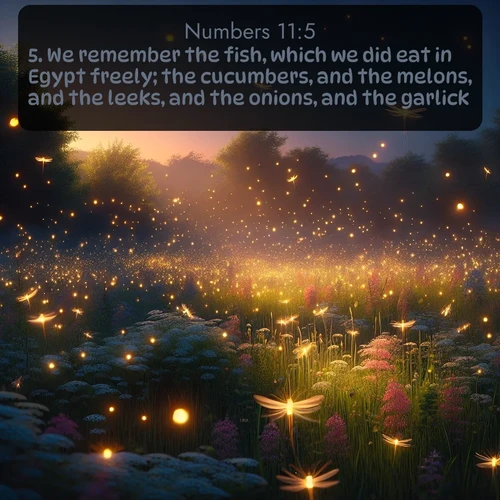Numbers 11:5 plusieurs versions / traductions
English Bible Translations
5. We remember the fish, which we did eat in Egypt freely; the cucumbers, and the melons, and the leeks, and the onions, and the garlick:
5. We remember the fish, which we did eat in Egypt for nought; the cucumbers, and the melons, and the leeks, and the onions, and the garlic:
5. Sweet is the memory of the fish we had in Egypt for nothing, and the fruit and green plants of every sort, sharp and pleasing to the taste:
5. We remember the fish that we ate in Egypt for nothing; the cucumbers, and the melons, and the leeks, and the onions, and the garlic;
5. We remember the fish which we ate in Egypt freely: the cucumbers, and the melons, and the leeks, and the onions, and the garlic:
5. We have remembered the fish which we do eat in Egypt for nought, the cucumbers, and the melons, and the leeks, and the onions, and the garlick;
German Bible Translations
5. Wir gedenken der Fische, die wir in Ägypten umsonst aßen, und der Kürbisse, der Melonen, des Lauchs, der Zwiebeln und des Knoblauchs.
5. Wir gedenken der Fische, die wir in Ägypten umsonst aßen, und der Gurken und Melonen, des Lauchs, der Zwiebeln und des Knoblauchs;
French Bible Translations
5. Nous nous souvenons des poissons que nous mangions en Egypte et qui ne nous coûtaient rien, des concombres, des melons, des poireaux, des oignons et des gousses d'ail.
5. Nous nous souvenons des poissons que nous mangions en Egypte, et qui ne nous coûtaient rien, des concombres, des melons, des poireaux, des oignons et des aulx.
5. Nous nous souvenons des poissons que nous mangions en Egypte, et qui ne nous coûtaient rien, des concombres, des melons, des poireaux, des oignons et des aulx.
5. Qui nous fera manger de la chair? Il nous souvient du poisson que nous mangions en Égypte pour rien, des concombres, et des melons, et des poireaux, et des oignons, et de l'ail;
5. Il nous souvient des poissons que nous mangions en Egypte, sans qu'il nous en coûtât rien, des concombres, des melons, des poireaux, des oignons, et des aulx.
5. Il nous souvient des poissons que nous mangions en Égypte, pour rien; des concombres, des melons, des poireaux, des oignons et des aulx.
Versions with Strong Codes
Numbers 11 / KJV_Strong5. We remember[H2142] [H853] the fish,[H1710] which[H834] we did eat[H398] in Egypt[H4714] freely;[H2600] [H853] the cucumbers,[H7180] and the melons,[H20] and the leeks,[H2682] and the onions,[H1211] and the garlic: [H7762]
Strong Code definitions
H2142 zakar zaw-kar' a primitive root; properly, to mark (so as to be recognized),i.e. to remember; by implication, to mention; also (as denominative from H2145) to be male:--X burn (incense), X earnestly, be male, (make) mention (of), be mindful, recount, record(-er), remember, make to be remembered, bring (call, come, keep, put) to (in) remembrance, X still, think on, X well.
H853 'eth ayth apparent contracted from H226 in the demonstrative sense of entity; properly, self (but generally used to point out more definitely the object of a verb or preposition, even or namely):--(as such unrepresented in English). see H226
H1710 dagah daw-gaw' feminine of H1709, and meaning the same:--fish. see H1709
H834 'aher ash-er' a primitive relative pronoun (of every gender and number); who, which, what, that; also (as an adverb and a conjunction) when, where, how, because, in order that, etc.:--X after, X alike, as (soon as), because, X every, for, + forasmuch, + from whence, + how(-soever), X if, (so) that ((thing) which, wherein), X though, + until, + whatsoever, when, where(+ -as, -in, -of, -on, -soever, -with), which, whilst, + whither(- soever), who(-m, -soever, -se). As it isindeclinable, it is often accompanied by the personal pronoun expletively, used to show the connection.
H398 'akal aw-kal' a primitive root; to eat (literally or figuratively):--X at all, burn up, consume, devour(-er, up), dine, eat(-er, up),feed (with), food, X freely, X in...wise(-deed, plenty), (lay) meat, X quite.
H4714 Mitsrayim mits-rah'-yim dual of H4693; Mitsrajim, i.e. Upper and Lower Egypt:--Egypt, Egyptians, Mizraim.see H4693
H2600 chinnam khin-nawm' from H2580; gratis, i.e. devoid of cost, reason oradvantage:--without a cause (cost, wages), causeless, to cost nothing, free(-ly), innocent, for nothing (nought, in vain. see H2580
H853 'eth ayth apparent contracted from H226 in the demonstrative sense of entity; properly, self (but generally used to point out more definitely the object of a verb or preposition, even or namely):--(as such unrepresented in English). see H226
H7180 qishshu' kish-shoo' from an unused root (meaning to be hard); a cucumber (from the difficulty of digestion):--cucumber.
H20 'abattiyach ab-at-tee'-akh of uncertain derivation; a melon (only plural):--melon.
H2682 chatsiyr khaw-tseer' perhaps originally the same as H2681, from the greenness of a courtyard; grass; also a leek (collectively):--grass, hay,herb, leek. see H2681
H1211 btsel beh'-tsel from an unused root apparently meaning to peel; an onion:--onion.
H7762 shuwm shoom from an unused root meaning to exhale; garlic (from its rank odor):--garlic.
Prédications qui analysent les thèmes Nombres 11
Thèmes : Le peuple se plaint; Survivants de la peste; Promesses du SeigneurRelated Sermons discussing Numbers 11
Themes : Le peuple se plaint; Survivants de la peste; Promesses du Seigneursee also: Bible Key Verses ; KJV Bible Images, BBE Bible images

